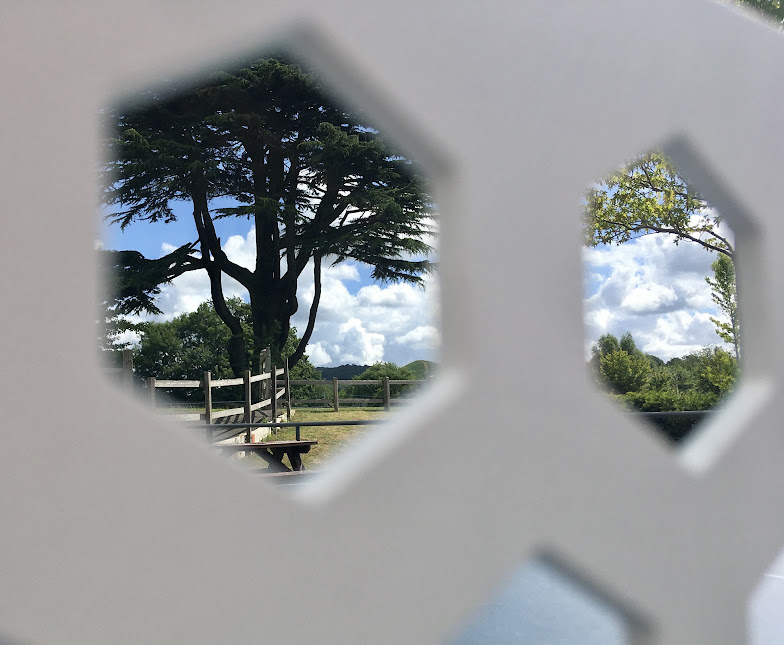This Week’s Bit of String: Ready for the close-up
To prepare for her A-Level Photography next year, I took a Year 11 student on a little expedition Thursday morning before the blue skies were completely obscured. We both had our mobile phone cameras and we found a wealth of photo ops right behind the school.
My student is a fan of the big picture. She stands back to get everything in one photo. I’m rather the same. It’s challenging to look at a whole panorama and remember to consider whether it would be even more striking from other angles, or broken down into close-ups.
Bit like writing, really.

So we were trying to get examples of low angles, high angles, and macrophotography. I found myself in a much more creative frame of mind, running around going, “Ooh, what if we tried this?”
My lovely autistic student started out not doing close-ups. I showed her examples of macrophotography, but her method was to say, “Out of the way, I’m going to take a picture!” She’d take one from really far, zoom in as much as possible, and crop after. The resolution of doing it this way is not ideal.
What the Framers Had in Mind
Framing is important. Proximity is, too. We’re working on Photography before Year 12 has officially started in order to ease this young lady into new ways of doing things. Whether we’re neurodivergent or not, we all need time to break habits and see new perspectives.
When it comes to running a country, the United States had a real headstart. The revered U.S. Constitution is pretty much the first of its kind, and is now about 234 years old. Did you know almost every other country in the world has a constitution now, and most were written in the last hundred years?

Needless to say, that encompasses a vast array of nations with varying success at the democratic experiment. But some of those countries are doing just fine, and are not in any way less free, equal, or prosperous. Which is weird, because who knew a people could derive liberty from a document NOT written by a few white guys in powdered wigs who thought not-white and not-male humans could be property.
As ever, much Supreme Court controversy comes from how “originalist” its Justices want to be, or not. Must all US legislations still be measured against the words of the original founding documents, or is there room to grow?
The thing is, even originalism is very much up for interpretation. If a law pertains to something not referenced in the Constitution, then is that thing not allowed to exist at all? Or does it mean we can do what we want with it? And there are many angles to originalism, and different approaches have been developed over the years.
Now What I’m Gonna Say May Sound Indelicate
The Founders themselves were not exactly orginalists. They included Amendment 9 to ensure that “unenumerated rights” which they might not have known about could still be allowed to exist, much later. They also went and added 2 more amendments in less than 20 years. I wonder if they envisioned that 234 years later, a top state official would explain before Congress that he believes their Constitution is “divinely inspired.” Particularly given most of the Founders were more interested in Locke and Rousseau than they were in the Bible.
When Edison invented his light bulb, did he expect we’d still be using the exact same version a century later? Because I don’t think we are.
I say we get a whole new Constitution. Give the thing a good edit; keep it broad yes, but maybe offer some clarity. Schedule it in for a full-on maintenance every fifty years maximum, to be carried out by a mix of scholars and ordinary people selected like jury duty. Look at the nation from new angles, get up close and see rather than continually trying to crop and fit the vision Jefferson et al. had. The resolution from how much they’d have had to zoom in to see us now, and vice versa, is just awful.

A new Constitution would never happen, I know. America has far bigger problems (although a lot of them stem from extreme constitutional interpretations) and too little time and money.
By the way, money features a LOT in the Constitution. Imports, duties, trade. War’s in there a fair bit. It’s true that women and God are never mentioned. Males are mentioned, and in fact Article I Section 8 mentions pirates! Ooh. So if you want to be super originalist, the Supreme Court has a lot more basis to rule regarding pirates than regarding women.
I really like some of what I’ve written, but I wouldn’t want anyone to base how they live their entire life around them, let alone how a whole country has to live. Though it’s exhausting work, the power to edit and evolve is a great relief and, well, freedom; as is the ability to learn from new people, whose voices may have been stifled before.
My student did start taking close-ups at the end of our session, by the way. She saw a single, white bindweed blossom grown up through a bush and charged right in through the branches to capture a shot of this “lonely flower.” I’m excited to see what else is going to inspire her, and learn from that myself.